The Anti-Awards 2010
The worst games of the year, strung up and ridiculed in front of the whole dang internet

Just a few weeks ago we firmly held each others’ hands and danced jigs of joy for 2010’s biggest and best games. Yes, our Platinum Chalice awardswere once again a festival of finery directed at the year’s brightest stars, but now come the dreaded Anti-Awards, which force a spotlight on all the bullshit games, trends and ideas we had to endure throughout the year.
To commemorate their anti-triumph, we’re awarding each “winner” with Bayonetta’s own Stone Award, the statue of a falling fat man that added insult to injury and nearly made us quit playing an otherwise brilliant game. Oh, what a day indeed.
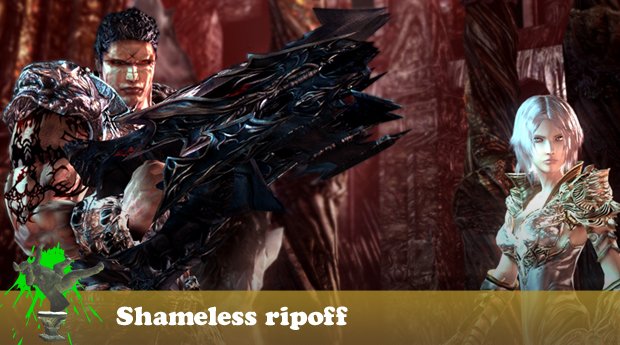
WINNER: Quantum Theory
If you’re going to crib from something successful, you should at least understand its appeal first. Take Gears of War, for example: is it well-regarded by Western gamers because it’s about a bunch of lunky no-necks who explode monster heads while grunting profanities? Or is it because of the flexible cover mechanic, co-op dynamics and the sheer guilty pleasure of dispatching a wide variety of beasts with chainsaws, explosive bows and other fun, diverse weaponry?
If you’re Quantum Theory developer Team Tachyon, you probably think it’s the former. Copying the look and fundamentals of GoW without ever getting the feel right, QT featured plenty of sticky cover, twisted scenery and fearsome-looking guns for fat-headed protagonist Syd to tote around. It even (in the beginning of the game) featured a band of hard-bitten, sass-talking freedom fighters to follow Syd into battle. But it was all a flimsy imitation of what Gears had already done better; the guns were nigh-useless, the battles were repetitive and the freedom fighters all bit it in the first act. And when QT tried to inject its own ideas (like shifting levels), the resultant awful platforming sealed the game’s status as an overall miserable experience.

Create
Is Create really just a drab, lifeless ripoff of LittleBigPlanet? Maybe not; both games are about building contraptions in quasi-2D levels, but one’s a platformer, while the other’s a puzzle game. Does the difference in gameplay make their obvious skin-deep similarities any easier to ignore? Not even slightly.
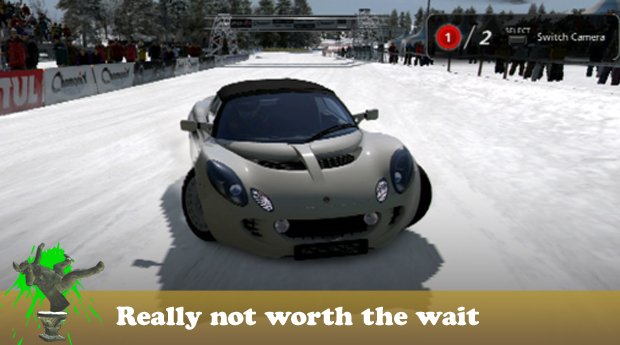
WINNER: Gran Turismo 5
Let's see. Some 800 PS2-grade vehicle models, with barely-enhanced trackside scenery, lower resolution shadows than the free version we were playing in 2006 and a menu system that's significantly inferior to anything we've used in a GT game before. At least we've got car damage now… which only became visible after three weeks of play. And is rubbish.
Massive install, long load times, awful difficulty balancing and an online mode that's already had to be patched to receive the most basic of leaderboards on a scant few tracks. Oh, and the final Rally event in the snow doesn't even use proper tracks – they're clearly generated by the track creator tool. That's unacceptable.
Weekly digests, tales from the communities you love, and more
Let's face it, we begrudgingly waited this long because we thought it was being polished to perfection. It wasn't. Now we'll have to wait until Gran Turismo 6 in… what, 2015?
Alan Wake

Since 2005 we’ve been drip-fed lovely screenshots of trees. Developer Remedy assured everyone that it'd be worth the wait. We concluded that Alan Wake would be special. It was finally released in 2010 and we discovered it mostly involved running about the woods at night trying to make sense of what was going on. Remedy even had the cheek to keep the real ending for paid DLC. Good one.
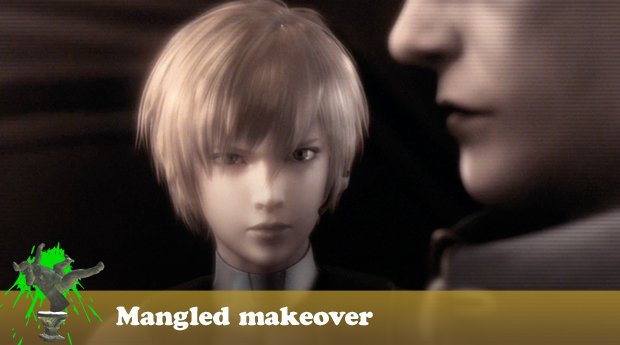
WINNER: Metroid Other M
For more than 20 years Samus Aran has stood as a proud videogame heroine. Though she’s uttered few words in two decades, her demeanor, conviction and bounty-hunting competence have made her one of the strongest female leads in a medium usually filled with walking tits. Other than a surprise reveal in the very first game, her gender is never hidden, subdued or compromised, and she‘s always portrayed as a woman at the top of her game. Hell, she doesn’t even have to share the spotlight with a dude.
Until Other M, which finally gave Samus a voice. And instead of further defining her as a confident lone wolf, Other M paints Samus as an unsure, insecure woman who desperately wants the approval of her former (male) commanding officer. Suddenly she has emotional baggage, suddenly she freezes in terror at the sight of her nemesis Ridley. What the what? She’s been stomping ass all over the galaxy longer than Master Chief and Commander Shepard put together, yet Samus’ first “real” speaking role redefines her as a typical anime girl playing with the big boys. All of these problems before we even get to Other M’s schizophrenic controls and gameplay…
Harry Potter and the Deathly Hallows %26ndash; Part 1

The idea isn't bad: Capture the more adult, action-packed vibe of the final Harry Potter by making the game a magic-themed Gears of War clone with spells instead of guns. The execution from EA, though, is terrible: the cover system, targeting and AI barely function, the graphics are a muddy mess, the much-publicized Kinect sections are lazy on-rail afterthoughts and the game actually features more buggy, frustrating stealth than shooting.
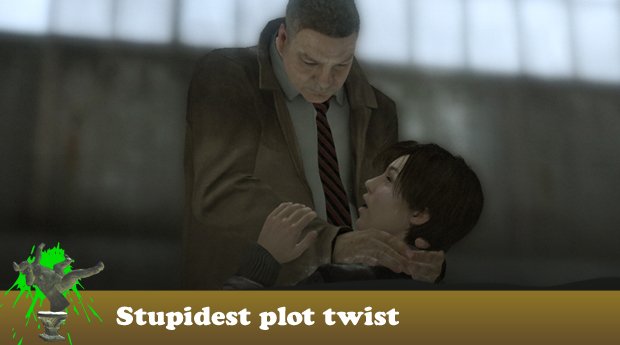
WINNER: Heavy Rain
It’s extremely rare that a videogame plot twist actually catches us off-guard, but Heavy Rain’s was a pretty big surprise. Not the kind of surprise that comes from an expertly crafted twist that casts everything before it in an entirely new light, mind you, but the kind that comes from finding out the flaming bag on your porch is filled with shit.
When Heavy Rain revealed that Scott Shelby – lovable, bear-like Scott Shelby, who’d risk beatings and death to save the lives of strangers – was the child-murdering Origami Killer, it felt so flimsy and contrived that we were at first convinced we’d stumbled onto one of several possible identities for the killer. There was nothing in Shelby’s behavior to indicate he was anything other than a good-hearted shamus, and when the game showed off the little “clues” it thought it had dropped, they felt like cheap, misleading tricks instead of subtle, easily missed tells. It was less a twist than a betrayal, and it made for a deeply unsatisfying conclusion to what was already a questionable script.
And before you argue that that in itself makes the twist more artistically valid, remember: “it’s always the one you least expect” is one of the oldest clichés in the book.
Enslaved

We thought Enslaved was a love / adventure story about two "opposites attract" characters fighting for survival and maybe, just maybe, falling for each other along the way. In the bizarrely out-of-place and out-of-nowhere ending, however, we discover that Enslaved is actually a shameless Matrix rip-off about Andy Serkis' giant head. And worse, that the painstakingly built romantic tension between our heroes will never be resolved.
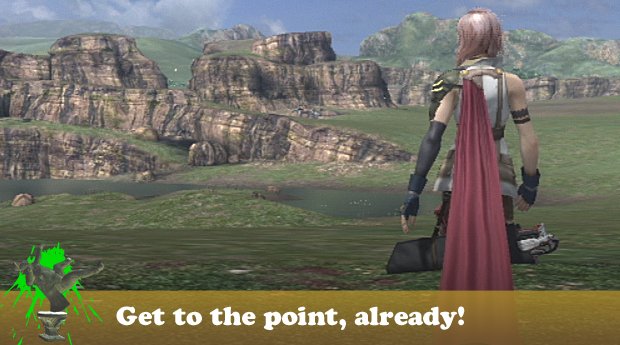
WINNER: Final Fantasy XIII
When you sit down with a 900 page novel, you certainly don’t expect the first 200 pages to lay everything on the table. No, you’d rightly expect that major revelations and plot points would come along halfway, even 2/3 of the way through the sweeping story. Final Fantasy XIII unfolds in this way as well – the 60-hour quest really packs a wallop and is one of our favorite stories of the current generation… but it literally takes 20 hours to get to the god damn point.
For a book, that’s fine. For a game, which requires constant, intensive interaction, this is utterly insane. Most modern games don’t even last for 20 hours period, and yet Square thinks most of us are willing to sit through that much exposition and battle tutorials before the game really opens up? Granted, the cast is on the run and barely knows what’s going on, and therefore is in the dark for much of the game. But that doesn’t mean we should be as well, especially when so much of the story is typical JRPG silliness. Hey, we loved the game, but we also understand the haters – this shit took way too long to get to the good stuff.

Red Dead Redemption
Rockstar’s big open-world games are always slow burners, but did we really need four days of herding before we met anyone of any relevance? And the incessant “princess in another castle” tease structure and endless fetch quests rapidly wore out their welcome once the story proper finally kicked off.


